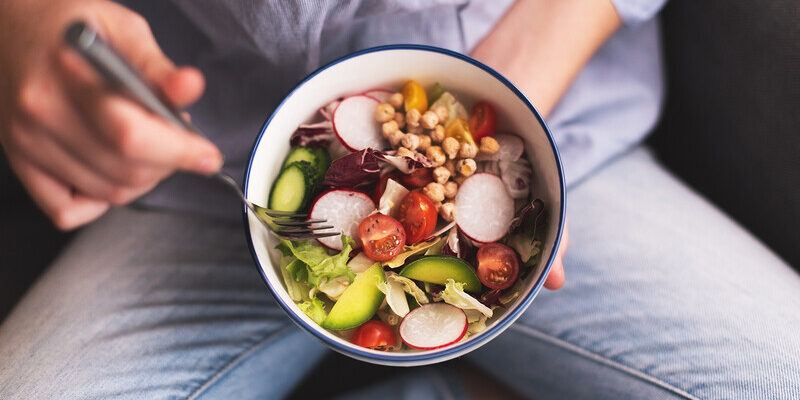Choosing to follow a vegetarian diet is a personal choice for a variety of reasons. Maybe your reasons are related to animal welfare, the environment, health, weight loss, or something else. Many people assume that becoming a vegetarian means you will lose weight and improve your health just by making the switch, but it’s more complicated than that. The power of plants has been shown to benefit heart disease, diabetes, cancer, weight management, inflammation, and even reduce pollution, so when you eliminate meat products (animal protein) from your diet it is essential to replace that animal protein with plant protein to maintain and/or improve your health and/or weight.
There are several different versions of vegetarianism:
- Lacto ovo – eats eggs and dairy but not meat
- Lacto – eats dairy, but not eggs or meat
- Vegan – does not eat dairy, eggs, meat, gelatin or honey (no animal products)
- Pescatarian – eats seafood, may also eat dairy/eggs but not meat
If you include dairy in your diet you can still consume whey protein shakes, if you do not consume dairy here are several options for high protein vegan shakes that are suitable for bariatric patients:
- Vega (25g per scoop)
- Plant Fusion (21g per scoop)
- Garden of Life Raw Organic (22g per scoop)
- Orgain (21g per scoop)
- KOS Organic plant based (20g per 2 scoops)
- Gold Standard 100% Plant (24g per scoop)
It is important to note that whey protein is typically recommended to patients for the first six months after surgery to support preserving lean muscle mass during rapid weight loss.
There are many other sources of plant protein, however plant proteins (except for soy/edamame) are incomplete, meaning they do not contain all of the essential amino acids we need. Vegetarians must often “combine” different plant proteins in order to consume all the essential amino acids our bodies require.
Other sources of plant of protein include:
- Tempeh
- Lentils and beans
- Sunflower, pumpkin, flax and chia seeds
- Nuts & nut butters
- Peas
- Quinoa
- Hummus
- Fortified plant “milk”
- Oatmeal (regular/steel cut)
- As well as other whole grains and veggies
Dairy and eggs are sources of complete proteins for vegetarians who do consume dairy/eggs.
Below is a sample of a protein and produce one-day meal plan:
*Bariatric patients aim for 60-80gms protein per day.
| Breakfast | ½ cup oatmeal cooked in 1 cup water
1 scoop Orgain protein powder 1 tbsp PB2 ½ cup strawberries, chopped Cinnamon & nutmeg to taste |
| Snack | 1 cup roasted edamame
Seasoned with sea salt, garlic, pepper, chili & lime juice |
| Lunch | Morningstar grillers prime veggie burger
Side salad: ½ cup chopped romaine, 1 small tomato chopped, ½ cucumber chopped with homemade dressing (1 tbsp oil, 1 tbsp vinegar & seasoning) |
| Snack | ½ banana and 1 tbsp peanut butter |
| Dinner | 5 oz tofu stir fried with 1 tbsp low sodium soy sauce, ½ cup chopped broccoli, ½ cup chopped carrots, 1 tbsp chopped peanuts |
| Nutrition facts: | 1170 calories, 82gms protein, 99gms carbs, 27gms fiber, 58gms fat |
Danielle Johnson RDN, CDN is a registered dietitian who works in the Bariatric Center of Excellence at Mather Hospital where she specializes in surgical weight loss and medical weight management.

